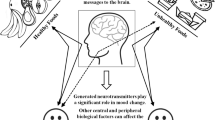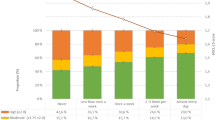Abstract
Objectives
We examined perceived stress and food intake at University of Turku, Finland.
Methods
This study was conducted as an online survey (1189 students). We computed two composite food intake pattern scores (sweets, cakes and snacks; fruits and vegetables), a dietary guideline adherence index, and the subjective importance of healthy eating. We assessed the correlations between perceived stress, and two food intake pattern scores, dietary guideline adherence index and subjective importance of healthy eating. We tested the associations between stress and the same variables, controlling for potential confounders for the whole sample, by gender, and by Body Mass Index (BMI).
Results
Fruits and vegetables intake and dietary guideline adherence were both negatively associated with stress. These negative associations were more pronounced in overweight and less pronounced in underweight compared to healthy weight students. Sweets, cookies and snacks consumption were not associated with stress. Stress was associated with lower subjective importance of healthy eating, independent of gender and BMI.
Conclusions
Perceived stress might have relationships of different magnitudes in overweight vs. normal BMI or underweight persons. BMI could be an effect modifier of the stress–food habits association.
Similar content being viewed by others
References
Adam TC, Epel ES (2007) Stress eating and the reward system. Physiol Behav 91:449–458
Al-Naggar RA, Bobryshev YV, Mohd Noor NA (2013) Lifestyle practice among Malaysian university students. Asian Pac J Cancer Prev 14(3):1895–1903
Bakr EM, Ismail NA, Mahaba HM (2002) Impact of life style on the nutritional status of medical students at Ain Shams University. J Egypt Public Health Assoc 77(1–2):29–49
Braverman MT, Hoogesteger LA, Johnson JA (2015) Predictors of support among students, faculty and staff for a smoke-free university campus. Prev Med 71:114–120
Chan GC, Koh D (2007) Understanding the psychosocial and physical work environment in a Singapore medical school. Singapore Med J 48(2):166–171
Cohen S, Kamarck T, Mermelstein R (1983) A global measure of perceived stress. J Health Soc Behav 24(4):385–396
El Ansari W (2014) Health and well-being of students at higher education institutions–time for urgent action? Cent Eur J Public Health 22(2):67
El Ansari W, Stock C (2010) Is the health and wellbeing of university students associated with their academic performance? Cross sectional findings from the United Kingdom. Int J Environ Res Public Health 7(2):509–527
El Ansari W, Stock C, Mikolajczyk RT (2012) Relationships between food consumption and living arrangements among university students in four European countries—a cross-sectional study. Nutr J 11:28. doi:10.1186/1475-2891-11-28
El Ansari W, Adetunji H, Oskrochi R (2014a) Food and mental health: relationship between food and perceived stress and depressive symptoms among university students in the United Kingdom. Cent Eur J Public Health 22(2):90–97
El Ansari W, Dibba E, Stock C (2014b) Body image concerns: levels, correlates and gender differences among students in the United Kingdom. Cent Eur J Public Health 22(2):106–117
El Ansari W, Khalil K, Crone D, Stock C (2014c) Physical activity and gender differences: correlates of compliance with recommended levels of five forms of physical activity among students at nine universities in Libya. Cent Eur J Public Health 22(2):98–105
El Ansari W, Oskrochi R, Haghgoo G (2014d) Are students’ symptoms and health complaints associated with perceived stress at university? Perspectives from the United Kingdom and Egypt. Int J Environ Res Public Health 11(10):9981–10002
Epel E, Jimenez S, Brownell K, Stroud L, Stoney C, Niaura R (2004) Are stress eaters at risk for the metabolic syndrome? Ann N YAcad Sci 1032:208–210
Fillman VM (2015) Career interest, self-efficacy, and perception in undecided and nursing undergraduate students: a quantitative study. Nurse Educ Today 35(1):251–255
Greeno C, Wing RR (1994) Stress-induced eating. Psychol Bull 115:444–464
Groesz LM, McCoy S, Carl J, Saslow L, Stewart J, Adler N et al (2012) What is eating you? Stress and the drive to eat. Appetite 58:717–721
Haskell WL, Lee IM, Pate RR, Powell KE, Blair SN, Franklin BA, Macera CA, Heath GW, Thompson PD, Bauman A, American College of Sports Medicine, American Heart Association (2007) Physical activity and public health: updated recommendation for adults from the American College of Sports Medicine and the American Heart Association. Circulation 116(9):1081–1093
Heikkinen R, Kivastik J, Kingisepp PH, Hirvonen L, Näyhä S (2006) Smoking differences between university faculties in Tartu, Estonia, and Oulu, Finland, after the disruption of communism. Soz Praventivmed 51(6):381–391
Jääskeläinen A, Nevanperä N, Remes J, Rahkonen F, Järvelin MR, Laitinen J (2014) Stress related eating, obesity and associated behavioural traits in adolescents a prospective population based cohort study. BMC Public Health 14:321
Kanerva N, Kaartinen NE, Schwab U, Lahti-Koski M, Mannisto S (2013) Adherence to the Balti Sea diet consumed in the Nordic countries is associated with lower abdominal obesity. Br J Nutr 109:520–528
Kivimäki M, Head J, Ferrie JE, Shipley MJ, Brunner E, Vahtera J, Marmot MG (2006) Work stress, weight gain and weight loss: evidence for bidirectional effects of job strain on body mass index in the Whitehall II study. Int J Obes (Lond). 30(6):982–987
Kuuppelomäki M, Utriainen P (2003) A 3 year follow-up study of health care students’ sense of coherence and related smoking, drinking and physical exercise factors. Int J Nurs Stud 40(4):383–388
Laitinen P, Nissinen A, Myllykangas M (1993) Fat consumption of first-grade students in elementary school. Quality and quantity of fats used at home and at school. Hoitotiede 5(2):50–55
Levine AS, Morley JE (1981) Stress-induced eating in rats. Am J Physiol 241:R72–R76
Michaud C, Kahn JP, Musse N, Burlet C, Nicolas JP, MeJean L (1990) Relationships between a critical life event and eating behavior in high school students. Stress Med 6:57–64
Morley JE, Levine AS, Rowland NE (1983) Minireview. Stress induced eating. Life Sci 32:2169–2182
Oliver G, Wardle J (1999) Perceived effects of stress on food choice. Physiol Behav 66(3):511–515
Osler M, Heitmann BL (1996) The validity of a short food frequency questionnaire and its ability to measure changes in food intake: a longitudinal study. Int J Epidemiol 25:1023–1029
Pohjanheimo T, Luomala H, Tahvonen R (2010) Finnish adolescents’ attitudes towards wholegrain bread and healthiness. J Sci Food Agric 90(9):1538–1544
Pollard TM, Steptoe A, Canaan L, Davies GJ, Wardle J (1995) Effects of academic examination stress on eating behavior and blood lipid levels. Int J Behav Med 2:299–320
Prättälä R, Helasoja V, Mykkänen H (2001) The consumption of rye bread and white bread as dimensions of health lifestyles in Finland. Public Health Nutr 4(3):813–819
Puska P, Tuomilehto J, Nissinen A et al (eds) (1995) The North Karelia Project. 20 year results and experiences. Finland University Press, Helsinki
Rautopuro J, Vaisanen P (2001) Non-traditional students at university: a follow-up study of young and adult students’ orientations, satisfaction and learning outcomes. In: Paper presented at the European conference on educational research, Lille, 5–8 September 2001
Roddam AW, Spencer E, Banks E, Beral V, Reeves G, Appleby P, Barnes I, Whiteman DC, Key TJ (2005) Reproducibility of a short semi- quantitative food group questionnaire and its performance in estimating nutrient intake compared with a 7-day diet diary in the Million Women Study. Public Health Nutr 8:201–213
Roos E, Talala K, Laaksonen M, Helakorpi S, Rahkonen O, Uutela A, Prättälä R (2008) Trends of socioeconomic differences in daily vegetable consumption, 1979–2002. Eur J Clin Nutr 62(7):823–833
Rossetti C, Halfon O, Boutrel B (2014) Controversies about a common etiology for eating and mood disorders. Front Psychol 5:1205
Schnettler B, Denegri M, Miranda H, Sepúlveda J, Orellana L, Paiva G, Grunert KG (2013) Eating habits and subjective well-being among university students in southern Chile. Nutr Hosp 28(6):2221–2228
Sims R, Gordon S, Garcia W, Clark E, Monye D, Callender C et al (2008) Perceived stress and eating behaviors in a community-based sample of African Americans. Eat Behav 9:137–142
Singh M (2014) Mood, food and obesity. Front Psychol 5:925
Stone A, Brownell K (1994) The stress-eating paradox: multiple daily measurements in adult males and females. Psychol Health 9:425–436
Tryon MS, DeCant R, Laugero KD (2013) Having your cake and eating it too: a habit of comfort food maz link chronical stress exposure and acute stress-induced cortisol hyporesponsiveness. Physiol Behav 114–115:32–37
University World News (2009). FINLAND: women dominate the campus. http://www.universityworldnews.com/article.php?story=20091211083716523
Uusitupa M, Hermansen K, Savolainen MJ, Schwab U, Kolehmainen M, Brader L, Mortensen LS, Cloetens L et al (2013) J Intern Med 274:52–66
WHO (2000) Obesity: preventing and managing the global epidemic. World health organization, Geneva
WHO (2003) Food based dietary guidelines in the WHO European Region, World health organization regional office Copenhagen
Yoshikawa T, Tanaka M, Ishii A (2014) Association of fatigue emotional-eating behaviour and the response to mental stress in food intake in a young adult population. Behav Med 40:149–153
Acknowledgments
The authors acknowledge the University, the Faculties and students who participated in this study. There was no external financial support/ funding for this study. The authors also acknowledge and thank the Student Management Office at the University of Turku for their assistance with the online survey and for their inputs in data collection. The authors declare that they have no conflict of interest.
Author information
Authors and Affiliations
Corresponding author
Electronic supplementary material
Below is the link to the electronic supplementary material.
Rights and permissions
About this article
Cite this article
El Ansari, W., Suominen, S. & Berg-Beckhoff, G. Mood and food at the University of Turku in Finland: nutritional correlates of perceived stress are most pronounced among overweight students. Int J Public Health 60, 707–716 (2015). https://doi.org/10.1007/s00038-015-0717-4
Received:
Revised:
Accepted:
Published:
Issue Date:
DOI: https://doi.org/10.1007/s00038-015-0717-4




